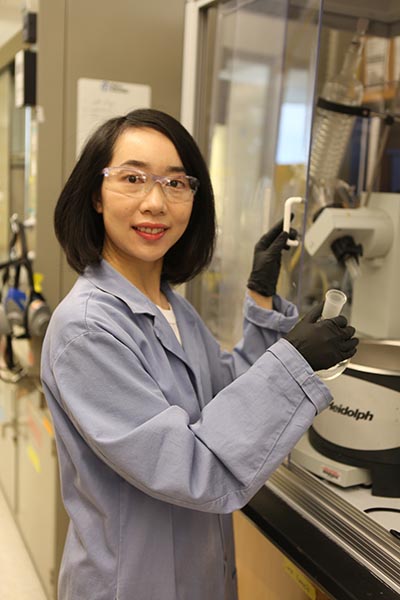Meet the Researchers: Sijia Yi
Sijia Yi is a postdoctoral fellow in the lab of SQI faculty member Evan Scott. She joined Scott’s group in 2014 after earning her PhD from the University of Tennessee, Knoxville. Yi has published 15 papers in peer-reviewed journals and presented a talk titled "Cardiovascular Immunotherapy: Engineering Nanocarriers for Selective Modulation of Inflammatory Cells" on Jan. 16 at the Rising Stars of SQI Lecture.
Read the interview below to learn more about Yi and her research.
What attracted you to Professor Scott’s lab and Northwestern in general?
His research areas intrigued me because he’s working on very exciting projects in immunoengineering, which is a new field for translational immunotherapies, and that’s what I wanted to do during my postdoctoral training. In my PhD studies, I worked a lot on biomedical engineering and also nanoparticles for drug delivery in different applications. I’m really interested in doing something new and different, like immunoengineering, because of the amazing advances in immunotherapy in recent years. 
Immunotherapy has revolutionized treatment because it’s totally different than traditional treatment. People call these ‘live drugs’ because they use the power of our own immune system to recognize and fight diseases, so I find it interesting.
As far as Northwestern, I heard a long time ago that this was a famous university and there is a lot of nice and challenging science here. I think the environment here is great.
How would you explain your Rising Stars lecture topic to a non-scientist?
My lecture was about cardiovascular immunotherapy. We know that cardiovascular disease is the leading cause of death in the developed world, and the major cause of cardiovascular disease is atherosclerosis. It’s a chronic disease that involves fatty lesions in our arteries and makes our other organs dysfunction. It can lead to heart attacks and strokes.
Recent studies find that it’s not only this extra fat in the body, but also the unresolved inflammation that makes the disease more severe and chronic. That’s the reason why some clinical drugs like statins (which work primarily by lowering cholesterol levels) aren’t working every time and for every patient.
We want to resolve the inflammation in the arteries and we want to cure the disease. We know that there are a lot of white blood cells involved in maintaining and developing inflammation — such as dendritic cells, macrophages, and T cells — and we want to target inflammatory cell populations. By manipulating these types of cells in mice, we were able to get the desired immune responses and decrease the inflammation in the artery and restore function to normal.
What is the next step of this research?
We have published a few papers on this, one in ACS Nano and one in Advanced Functional Materials — all on my work with engineering materials to target inflammatory cells in cardiovascular immunotherapy.
Cardiovascular disease is one of the biggest focuses of our lab, so we’re still working on this. In previous studies, we used IV injection and found the response was very good, but we know that doing intravenous injections multiple times is not very practical in the clinic. So, one of our recent projects aims to provide sustained delivery of anti-inflammatory nanocarriers that are injected as a subcutaneous hydrogel.
What other projects are you working on?
My lecture was about cardiovascular immunotherapy but my research interests focus more broadly on manipulating the immune system and developing therapeutic strategies for a diverse set of diseases — not only for cardiovascular disease, but for cancer and for infectious diseases. I have a paper that I’m planning to submit next month on Chagas disease, a parasitic-type of infectious disease, and the other two projects I’m working on involve cancer immunotherapy.
What are you most proud of in your research career so far?
I’ve definitely used some novel and creative methods to enhance the efficiency of immunotherapy in cardiovascular disease, and our preliminary data also shows a very good effect for cancer therapy. We can enhance the efficiency of these therapies a lot, and that’s something I’m so proud of.
What are some activities you enjoy outside of the lab?
I like reading books, hiking with my family and I’m a big foodie. I like to try different foods and go to restaurants, or when traveling, find someplace good to eat. There’s a lot of delicious food in Chicago.
